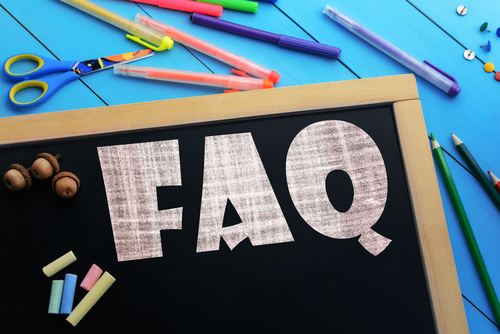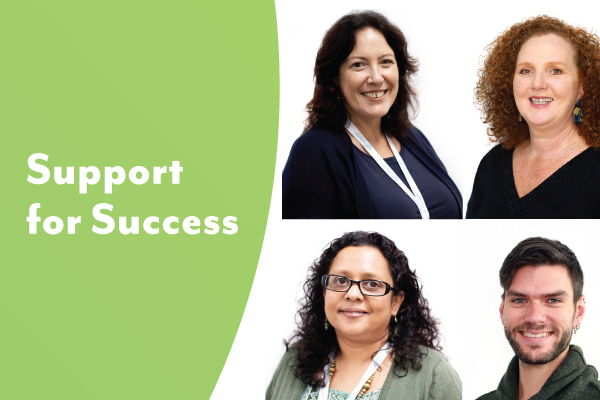If you’re thinking about studying a new course in early childhood education and care, you might have some questions on your mind. These might be specific questions like how long will my course take? or more abstract questions like will I be able to do it?

Being informed can make you feel a lot more confident, and we’re here make sure you have all the information you need. Below, we’ll take you through some of the top FAQs about studying and working in early childhood education and care.
Why should I study early childhood education?
Chances are that if you’re reading this, you’ve already got list of reasons why you want to study early childhood education. On the other hand, you might be unsure whether it’s the right choice for you.
Early childhood education has its challenges, but encouraging young children to grow and thrive can be incredibly fulfilling – and with plenty of career opportunities and an increasing demand for passionate educators, now is a great time to start your own journey.
When you get qualified in early childhood education, you can be certain you’ll develop skills for life.

Why study with an RTO?
So what exactly is an RTO, and why should you study with us?
Firstly, Registered training organisations (RTOs) deliver nationally accredited courses in the VET sector. To become an RTO you need to meet a range of requirements to ensure the training you provide is of the highest quality. Practical Outcomes is a trusted RTO specialising in training a strong and skilled early childhood education workforce — so the first thing you can be sure of is that you’re in good hands.
Secondly, vocational training courses are developed with employment in mind. With high demand in early childhood education, there has never been a better time to start your training.
Is it safe to study with an RTO?
Yes. You may have heard about recent RTO closures, but rest assured you’re safe with Practical Outcomes.
We’re proud to say we have a longstanding reputation as one of the highest quality training providers in Victoria. Our recent NCVER results indicate that our learners are satisfied and that our training helps people get jobs.
Since 2018 we’ve been among a select number of providers with a Skills First contract with the Victorian Government, so you can be certain that we’ll continue providing the excellent skills training we’re known for.
What is practical placement?

Practical placement is the part of your course where you get to experience a real-life workplace.
Your early childhood education course will involve a practical placement component as part of the course requirements. This is because we believe it’s important for learners to see what the workplace is really like.
Placement is a great way to develop confidence and attain the practical skills which will get you a great job after you graduate.
How does practical placement work?
If you’re feeling apprehensive about undertaking practical placement, know that our dedicated coordinators are here to make it as easy and comfortable as possible.
Firstly, your coordinator will consider your individual needs and try to match you with a centre or facility you’ll be suited to. We call our coordinators ‘matchmakers’ because they’re so good at matching learners with their perfect placement.
If you’d prefer to organise placement yourself, that’s okay too! At the end of the day we want you to be happy and comfortable so that you can get the most out of your placement.
During placement, your trainer will drop in to check on your progress, and eventually you will be assessed on your practical skills. Then it’s time to finish your course and get out into the workplace.

Is studying early childhood education difficult?
Maybe you’ve decided to study early childhood education and care and now you’re thinking, this course looks complicated – is it going to be really hard?
The answer is no, it’s not going to be difficult. It’s going to challenge you, not demand your blood sweat and tears.
We’ve developed our courses to reflect the challenges of the sector, but we’re not trying to make your life hell. We want you to get a good sense of what you’re up for once you graduate and develop a working understanding of the role so that you can feel confident and inspired.
With a balanced blend of theory and practice, your course will challenge you in ways that help you become be the best educator you can be.
What kind of support can I expect while studying?
Making sure you’re supported in every way is important to us. You will have access to a dedicated Learner Support Team who can provide extra resources, help and guidance.
This might look like literacy and numeracy support, study skills or course advice. It might simply be having someone to talk to when you’re feeling overwhelmed.
Whatever it is, we’re here to make sure you feel supported to achieve your goals.

How long will it take to complete my course?
That depends, but most of our courses take around 12 months to complete. Unlike university courses, which can take many years to complete, vocational training is designed with the goal of getting you out into the workplace as soon as you’re ready.
Am I eligible for funding or concessions to help pay for my course?
Eligible learners will have the opportunity to access funding for most of our courses through programs like Skills First and Job Trainer. One of the first things you should do when considering a new course is have a chat with one of our experienced advisors to find out what funding options are available.
If you’re not eligible for funding, we can support you through financial assistance.
Still have questions?
If you’ve read to the end and still have questions, never fear! Head to our FAQs page for more answers. Our blog is also a great place for useful information.
You’re welcome to contact us anytime for a helpful one-on-one chat.



